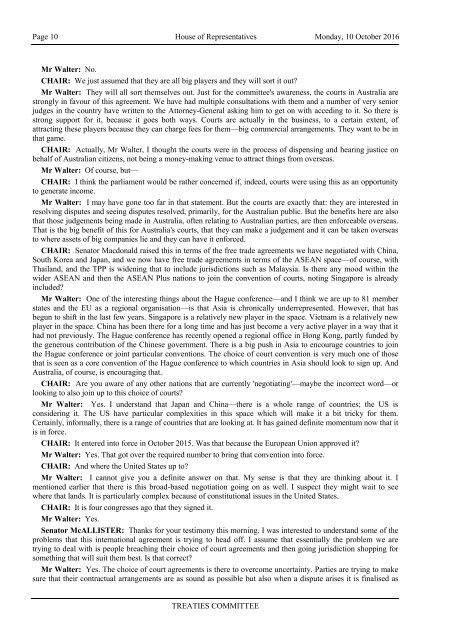Proof Committee Hansard
2d908Ic
2d908Ic
You also want an ePaper? Increase the reach of your titles
YUMPU automatically turns print PDFs into web optimized ePapers that Google loves.
Page 10 House of Representatives Monday, 10 October 2016<br />
Mr Walter: No.<br />
CHAIR: We just assumed that they are all big players and they will sort it out?<br />
Mr Walter: They will all sort themselves out. Just for the committee's awareness, the courts in Australia are<br />
strongly in favour of this agreement. We have had multiple consultations with them and a number of very senior<br />
judges in the country have written to the Attorney-General asking him to get on with acceding to it. So there is<br />
strong support for it, because it goes both ways. Courts are actually in the business, to a certain extent, of<br />
attracting these players because they can charge fees for them—big commercial arrangements. They want to be in<br />
that game.<br />
CHAIR: Actually, Mr Walter, I thought the courts were in the process of dispensing and hearing justice on<br />
behalf of Australian citizens, not being a money-making venue to attract things from overseas.<br />
Mr Walter: Of course, but—<br />
CHAIR: I think the parliament would be rather concerned if, indeed, courts were using this as an opportunity<br />
to generate income.<br />
Mr Walter: I may have gone too far in that statement. But the courts are exactly that: they are interested in<br />
resolving disputes and seeing disputes resolved, primarily, for the Australian public. But the benefits here are also<br />
that those judgements being made in Australia, often relating to Australian parties, are then enforceable overseas.<br />
That is the big benefit of this for Australia's courts, that they can make a judgement and it can be taken overseas<br />
to where assets of big companies lie and they can have it enforced.<br />
CHAIR: Senator Macdonald raised this in terms of the free trade agreements we have negotiated with China,<br />
South Korea and Japan, and we now have free trade agreements in terms of the ASEAN space—of course, with<br />
Thailand, and the TPP is widening that to include jurisdictions such as Malaysia. Is there any mood within the<br />
wider ASEAN and then the ASEAN Plus nations to join the convention of courts, noting Singapore is already<br />
included?<br />
Mr Walter: One of the interesting things about the Hague conference—and I think we are up to 81 member<br />
states and the EU as a regional organisation—is that Asia is chronically underrepresented. However, that has<br />
begun to shift in the last few years. Singapore is a relatively new player in the space. Vietnam is a relatively new<br />
player in the space. China has been there for a long time and has just become a very active player in a way that it<br />
had not previously. The Hague conference has recently opened a regional office in Hong Kong, partly funded by<br />
the generous contribution of the Chinese government. There is a big push in Asia to encourage countries to join<br />
the Hague conference or joint particular conventions. The choice of court convention is very much one of those<br />
that is seen as a core convention of the Hague conference to which countries in Asia should look to sign up. And<br />
Australia, of course, is encouraging that.<br />
CHAIR: Are you aware of any other nations that are currently 'negotiating'—maybe the incorrect word—or<br />
looking to also join up to this choice of courts?<br />
Mr Walter: Yes. I understand that Japan and China—there is a whole range of countries; the US is<br />
considering it. The US have particular complexities in this space which will make it a bit tricky for them.<br />
Certainly, informally, there is a range of countries that are looking at. It has gained definite momentum now that it<br />
is in force.<br />
CHAIR: It entered into force in October 2015. Was that because the European Union approved it?<br />
Mr Walter: Yes. That got over the required number to bring that convention into force.<br />
CHAIR: And where the United States up to?<br />
Mr Walter: I cannot give you a definite answer on that. My sense is that they are thinking about it. I<br />
mentioned earlier that there is this broad-based negotiation going on as well. I suspect they might wait to see<br />
where that lands. It is particularly complex because of constitutional issues in the United States.<br />
CHAIR: It is four congresses ago that they signed it.<br />
Mr Walter: Yes.<br />
Senator McALLISTER: Thanks for your testimony this morning. I was interested to understand some of the<br />
problems that this international agreement is trying to head off. I assume that essentially the problem we are<br />
trying to deal with is people breaching their choice of court agreements and then going jurisdiction shopping for<br />
something that will suit them best. Is that correct?<br />
Mr Walter: Yes. The choice of court agreements is there to overcome uncertainty. Parties are trying to make<br />
sure that their contractual arrangements are as sound as possible but also when a dispute arises it is finalised as<br />
TREATIES COMMITTEE















